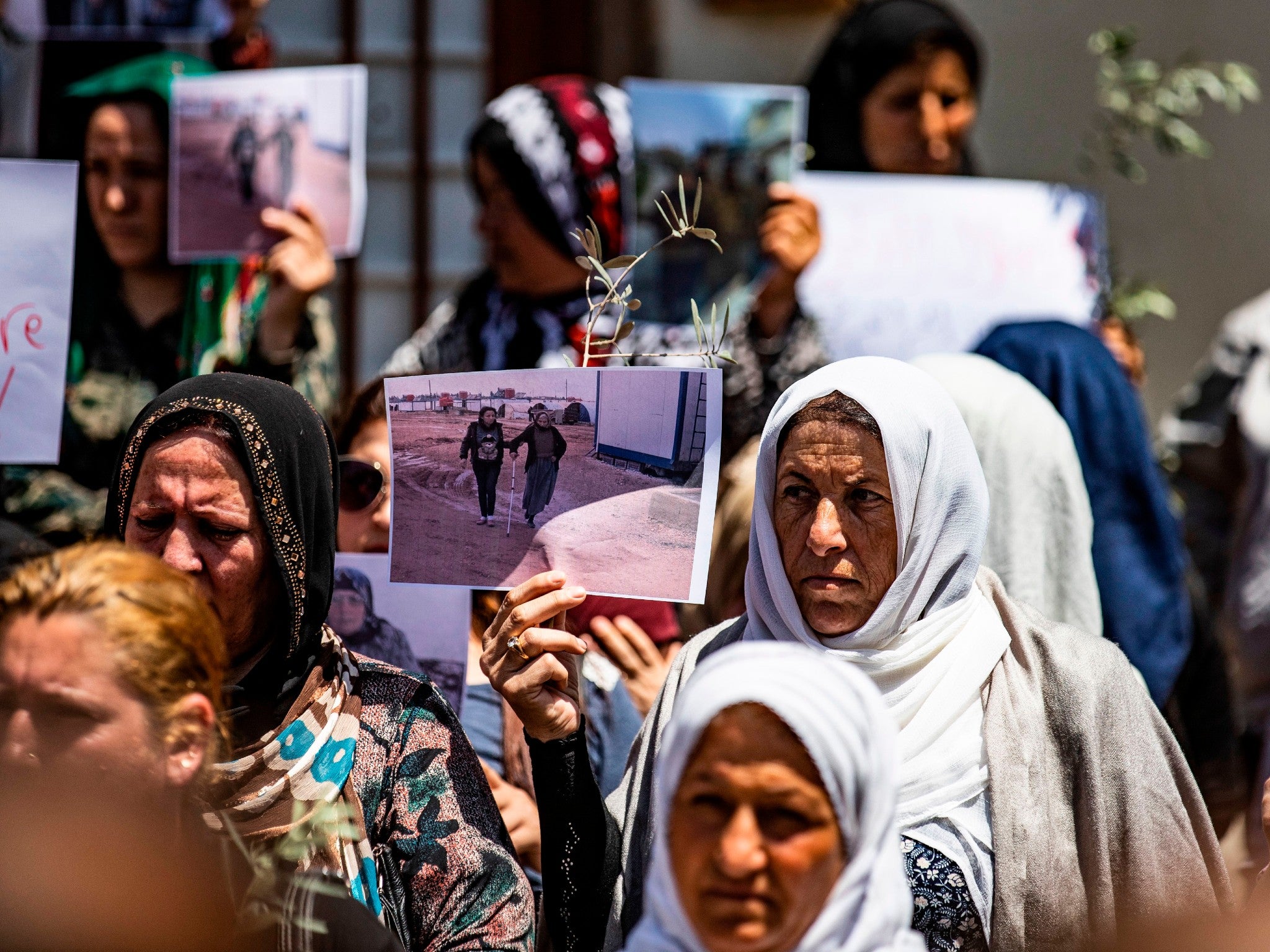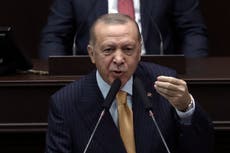Trump’s worst crime must not be forgotten - ensuring the ethnic cleansing of Kurdish allies in Syria
Eyewitness testimony lays bare the atrocities committed in territory occupied by Turkey


It was the worst crime of Donald Trump’s years in the White House. In October 2019 he ordered US troops to stand aside, greenlighting Turkey’s invasion of northern Syria that led to the murder, rape and expulsion of its Kurdish inhabitants
Eighteen months earlier, Trump did nothing as the Turkish army occupied the Kurdish enclave of Afrin and replaced the population there with Syrian Arab jihadis.
It is, unfortunately, unlikely that Trump will ever stand trial but, if he does, then his complicity in the ethnic cleansing of the Syrian Kurds should top the charge sheet. This was an act of evil in itself and also the betrayal of an ally since American-backed Syrian Kurdish fighters had led the counter-attack against Isis, closing in on its last strongholds just as Turkey invaded Afrin.
Trump’s treachery provoked too little international outrage at the time but I am certain it was the direct cause of murders, kidnappings, disappearances and the expulsions of hundreds of thousands of people.
Tragedy on this scale blurs in people’s minds because they do not comprehend atrocities beyond their personal experience which devastate the lives of so many individuals. The perpetrators of extreme violence – and their facilitators like Trump – try to muddy the waters with implausible denials until the news agenda moves on and it is only surviving victims who remember the crimes against them.
I wrote much about the ethnic cleansing of the Kurds from their homes in northern Syria by Turkey in two separate invasions in 2018 and 2019, but without any noticeable result. It soon became impossible for independent reporters to visit Afrin or the Turkish-occupied zone around the towns of Tal Abyad and Ras al-Ain. But I was finally able to make contact last week via the internet with an eyewitness in Afrin who gives a grim but compelling account of her personal experience of ethnic cleansing.
Her name is Rohilat Hawar, a 34-year-old Kurdish woman with three children who had worked as a mathematics teacher in a school in Afrin City before the Turkish attack. She tried to flee in February 2018 “because there were Turkish airstrikes every day,” but she was refused entry to Syrian government-held territory through which she needed to pass to reach the Kurdish-controlled autonomous region.
She returned to Afrin City where her house had been looted and where she is now trapped. She says that Turkish-backed Syrian jihadi militias shoot anybody trying to leave: "A friend of mine was killed with her 10-year-old child last year while trying to flee." At the same time, the militiamen make it impossible for Kurds to stay.
As one of the few Kurds remaining in her old neighbourhood where the houses have been taken over by Arabic-speaking jihadis and their families, she does not dare speak Kurdish in the street. She has found that the Turkish army considers all Kurds to be "terrorists", but that the militiamen are even more dangerous, regarding "Kurds as pagans, disbelievers who should be killed on orders from God."
Rohilat had no alternative but to put on a Hijab, which Kurdish women normally do not wear. She did not do so for seven months but was harassed and intimidated by jihadi neighbours from other parts of Syria. She appealed to a Turkish officer, but he said that she should respect the social norms in her neighbourhood. "So I had to put on the Hijab," she said. "My children laughed at me and mocked me at the beginning, but they have got used to the situation."
The surviving Kurds in Afrin are defenceless and are preyed on by roving militiamen. When going to the market earlier this week, Rohilat saw two Kurdish girls walking in the same direction. Two militiamen with guns on a motorcycle cruised slowly beside them. "Suddenly the motorcycle came close to the girls and the militiamen sitting on the back grabbed the breast of one of them," says Rohilat. Both girls started crying. The militiamen got off their motorcycle and started kissing them and fondling their breasts, only leaving them when a crowd gathered and Rohilat took the girls to her home.
On another occasion, she was buying bread in the market, when she saw an Islamist gunman tell a Kurd working in a restaurant to leave the city. When he protested, saying he had nowhere else to go, the militiaman slapped him across the face and said: "You Kurds are pagans and disbelievers in God [though the Kurds are almost all Sunni Muslims]."
In the two formerly Kurdish zones in Syria, the cutting edge of the Turkish occupation is Arab militiamen, who are mostly jihadis from elsewhere in Syria. The Kurds in Afrin were largely farmers, cultivating fruit and vegetables and, above all, olives. But Rohilat says that the new settlers are city people "so they cut down the olive trees and sell them as firewood". As a result, foodstuffs have to be imported and are sold at a higher price.
By turning over on the ground control of Kurdish populated areas to anti-Kurdish Islamist gunmen, the Turkish government ensures ethnic cleansing, but without appearing to be directly responsible. Until recently, the militiamen were paid $100 a month by Turkey, but they could supplement this by looting and confiscating Kurdish property while the Turkish army allegedly turned a blind eye.
But since August the militiamen’s pay has been reduced and Turkish army patrols are clamping down on looting. The aim of this is to persuade the militiamen to volunteer to fight as Turkish proxies in Libya and against the Armenians in Nagorno-Karabakh. Many have been killed. Rohilat has seen numerous traditional mourning tents for men who died in the fighting abroad, though the bodies do not come back for burial.
Aside from the chronic insecurity, Rohilat has to cope with the rapid spread of coronavirus in Afrin since August. She herself has contracted the illness, having tested positive at a Turkish medical facility, but says she and many others will not go to a military hospital for treatment because few people who do go return alive. Instead, they stay at home, taking paracetamol and eating lentil and onion soup. She herself cannot afford to buy face masks, and can only buy bread because her children do odd jobs in the market and relatives in Turkey send her a little money every couple of months.
Grim though life is for Rohilat, she is one of the survivors while other Kurds have fled, live in insanitary camps, been killed, held for ransom or have simply disappeared. Nor is the Turkish campaign against the 3 million Syrian Kurds likely to de-escalate; on the contrary, Turkish president Recep Tayyip Erdogan has threatened to launch another invasion that would in practice finish the job of cleansing the Kurdish population.
One piece of good news is that the replacement of Trump by Joe Biden significantly reduces, though it does not eliminate, the chances of the US greenlighting another Turkish incursion. As Trump and his poisonous crew depart, it should never be forgotten or forgiven that his manic policy in Syria inflicted endless misery on great numbers of people who once led happy lives.
Join our commenting forum
Join thought-provoking conversations, follow other Independent readers and see their replies
Comments





Bookmark popover
Removed from bookmarks